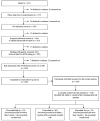"I know what you told me, but this is what I think:" perceived risk of Alzheimer disease among individuals who accurately recall their genetics-based risk estimate
- PMID: 20139767
- PMCID: PMC2921681
- DOI: 10.1097/GIM.0b013e3181cef9e1
"I know what you told me, but this is what I think:" perceived risk of Alzheimer disease among individuals who accurately recall their genetics-based risk estimate
Abstract
Purpose: This study evaluates the Alzheimer disease risk perceptions of individuals who accurately recall their genetics-based Alzheimer disease risk assessment.
Methods: Two hundred forty-six unaffected first-degree relatives of patients with Alzheimer disease were enrolled in a multisite randomized controlled trial examining the effects of communicating APOE genotype and lifetime Alzheimer disease risk information.
Results: Among the 158 participants who accurately recalled their Alzheimer disease risk assessment 6 weeks after risk disclosure, 75 (47.5%) believed their Alzheimer disease risk was more than 5% points different from the Alzheimer disease risk estimate they were given. Within this subgroup, 69.3% believed that their Alzheimer disease risk was higher than what they were told (discordant high), whereas 30.7% believed that their Alzheimer disease risk was lower (discordant low). Participants with a higher baseline risk perception were more likely to have a discordant-high risk perception (P < 0.05). Participants in the discordant-low group were more likely to be APOE epsilon4 positive (P < 0.05) and to score higher on an Alzheimer disease controllability scale (P < 0.05).
Conclusion: Our results indicate that even among individuals who accurately recall their Alzheimer disease risk assessment, many people do not take communicated risk estimates at face value. Further exploration of this clinically relevant response to risk information is warranted.
Conflict of interest statement
Disclosure: The authors declare no conflict of interest.
Figures



Similar articles
-
Effect of Alzheimer disease genetic risk disclosure on dietary supplement use.Am J Clin Nutr. 2010 May;91(5):1402-7. doi: 10.3945/ajcn.2009.28981. Epub 2010 Mar 10. Am J Clin Nutr. 2010. PMID: 20219963 Free PMC article.
-
Factors affecting recall of different types of personal genetic information about Alzheimer's disease risk: the REVEAL study.Public Health Genomics. 2015;18(2):78-86. doi: 10.1159/000368888. Epub 2015 Jan 24. Public Health Genomics. 2015. PMID: 25634646 Free PMC article. Clinical Trial.
-
Risk of dementia among white and African American relatives of patients with Alzheimer disease.JAMA. 2002 Jan 16;287(3):329-36. doi: 10.1001/jama.287.3.329. JAMA. 2002. PMID: 11790212
-
Susceptibility testing for Alzheimer's disease: race for the future.Lancet Neurol. 2002 May;1(1):10. doi: 10.1016/s1474-4422(02)00009-1. Lancet Neurol. 2002. PMID: 12849539 Review. No abstract available.
-
Folic acid supplementation and malaria susceptibility and severity among people taking antifolate antimalarial drugs in endemic areas.Cochrane Database Syst Rev. 2022 Feb 1;2(2022):CD014217. doi: 10.1002/14651858.CD014217. Cochrane Database Syst Rev. 2022. PMID: 36321557 Free PMC article.
Cited by
-
My Lived Experiences Are More Important Than Your Probabilities: The Role of Individualized Risk Estimates for Decision Making about Participation in the Study of Tamoxifen and Raloxifene (STAR).Med Decis Making. 2015 Nov;35(8):1010-22. doi: 10.1177/0272989X15594382. Epub 2015 Jul 16. Med Decis Making. 2015. PMID: 26183166 Free PMC article.
-
Amyloid imaging, risk disclosure and Alzheimer's disease: ethical and practical issues.Neurodegener Dis Manag. 2013;3(3):219-229. doi: 10.2217/nmt.13.25. Neurodegener Dis Manag. 2013. PMID: 26167204 Free PMC article.
-
Effect of communicating personalized rheumatoid arthritis risk on concern for developing RA: A randomized controlled trial.Patient Educ Couns. 2019 May;102(5):976-983. doi: 10.1016/j.pec.2018.12.011. Epub 2018 Dec 10. Patient Educ Couns. 2019. PMID: 30558852 Free PMC article. Clinical Trial.
-
Communicating genetic risk information for common disorders in the era of genomic medicine.Annu Rev Genomics Hum Genet. 2013;14:491-513. doi: 10.1146/annurev-genom-092010-110722. Annu Rev Genomics Hum Genet. 2013. PMID: 24003856 Free PMC article. Review.
-
Factors that affect the decision to undergo amniocentesis in women with normal Down syndrome screening results: it is all about the age.Health Expect. 2015 Dec;18(6):2306-17. doi: 10.1111/hex.12200. Epub 2014 May 12. Health Expect. 2015. PMID: 24816429 Free PMC article.
References
-
- Lipkus IM, Rimer BK, Strigo TS. Relationships among objective and subjective risk for breast cancer and mammography stages of change. Cancer Epidemiol Biomarkers Prev. 1996;5:1005–1011. - PubMed
-
- Schwartz LM, Woloshin S, Black WC, Welch HG. The role of numeracy in understanding the benefit of screening mammography. Ann Intern Med. 1997;127:966–972. - PubMed
-
- Woloshin S, Schwartz LM, Black WC, Welch HG. Women's perceptions of breast cancer risk: how you ask matters. Med Decis Making. 1999;19:221–229. - PubMed
Publication types
MeSH terms
Substances
Grants and funding
- K24-AG027841/AG/NIA NIH HHS/United States
- R01 AG009029/AG/NIA NIH HHS/United States
- P50-AG13846/AG/NIA NIH HHS/United States
- M01 RR000533/RR/NCRR NIH HHS/United States
- R24 HD041028/HD/NICHD NIH HHS/United States
- K24 AG027841/AG/NIA NIH HHS/United States
- M01-RR00533/RR/NCRR NIH HHS/United States
- R01 HG002213/HG/NHGRI NIH HHS/United States
- R01 HG005092/HG/NHGRI NIH HHS/United States
- R01-HG/AG02213/AG/NIA NIH HHS/United States
- R01-AG09029/AG/NIA NIH HHS/United States
- P30 AG013846/AG/NIA NIH HHS/United States
- P30 AG072978/AG/NIA NIH HHS/United States
LinkOut - more resources
Full Text Sources
Medical
Miscellaneous

